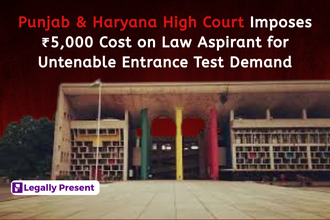The Supreme Court of India recently delivered a significant judgment concerning allegations of sexual harassment under the Sexual Harassment of Women at Workplace (Prevention, Prohibition and Redressal) Act, 2013 (POSH Act). The case involved a faculty member of the National University of Juridical Sciences (NUJS), Kolkata, who accused Vice-Chancellor Nirmal Kanti Chakrabarti of repeated misconduct. Although the Court dismissed the appeal due to limitation, it made an unprecedented order directing that the allegations be permanently recorded in the Vice-Chancellor’s professional records.
This ruling, delivered on September 12, 2025 by a Bench of Justices Pankaj Mithal and PB Varale, highlights the complexities of limitation under the POSH Act, the scope of continuing wrong, and accountability mechanisms in cases of workplace harassment.
Background of the Case
The appellant, a faculty member at NUJS, alleged that since 2019, the Vice-Chancellor had engaged in unwelcome advances, including inappropriate touching, repeated dinner requests, and threats when she refused his proposals. Despite professional setbacks, including a delay in her promotion in 2019, she was eventually promoted in 2022.
The last alleged act of sexual harassment occurred in April 2023, when the Vice-Chancellor allegedly invited her to a resort and threatened that her career would suffer if she declined. Following this, in August 2023, she was removed as Director of a research centre, and an inquiry was initiated into her handling of project funds.
The faculty member filed a formal complaint with the Local Complaints Committee (LCC) in December 2023, which was dismissed as being beyond the six-month limitation period under the POSH Act.
High Court Proceedings
- In May 2024, a single judge of the Calcutta High Court set aside the LCC’s rejection, holding that the Vice-Chancellor’s conduct created a continuing hostile work environment, thus keeping the complaint within time.
- However, in December 2024, a Division Bench of the High Court reversed this order. It held that administrative measures like her removal as Director and the financial inquiry were decisions of NUJS’s Executive Council and could not be attributed personally to the Vice-Chancellor. These actions were deemed administrative and not sexual harassment.
The appellant then approached the Supreme Court.
Supreme Court’s Findings
The apex court examined the complaint in detail and held:
- Limitation under POSH Act
The last act of sexual harassment occurred in April 2023. Since the complaint was filed in December 2023, it exceeded even the maximum six-month extension under the Act. - Continuing Wrong Doctrine Rejected
The Court clarified that sexual harassment incidents are complete acts in themselves. Administrative decisions taken later by independent bodies cannot extend the limitation period. - No Link Between Harassment and Administrative Decisions
The Court found no direct connection between the April 2023 incident and subsequent administrative actions like removal from post or initiation of an inquiry. - Technical Bar to Relief
While dismissing the complaint as time-barred, the Court acknowledged the seriousness of the allegations and stated that wrongdoing should not be forgotten merely because of a legal technicality.
The Court’s Unusual Direction
In a first-of-its-kind move, the Court ordered:
“It is directed that this judgment shall be made part of the resume of respondent no.1 (the Vice Chancellor), compliance of which shall be strictly ensured by him personally.”
This ensures that while the Vice-Chancellor cannot be penalized under the POSH Act due to limitation, the allegations remain a permanent part of his professional record, serving as a form of accountability.
Representation of Parties
- The appellant was represented by Senior Advocate Meenakshi Arora and Advocate Rishad Ahmed Chowdhury.
- The respondents were represented by Senior Advocate Madhavi Divan, assisted by a team of lawyers including Satya Ranjan Swain, Vishnu Kant, Ankush Kapoor, Kautilya Birat, Aandrita Deb, Rajnandini, Vishwadeep Chandrakar, Aayush Gupta, Kunal Chatterji, Maitrayee Banerjee, Varij Nayan Mishra, CK Rai, Vinay Kumar Gupta, and Sumit Panwar.
Legal and Social Significance of the Judgment
- Clarification on Limitation
The judgment reiterates that complaints under the POSH Act must be filed within the statutory time frame. The “continuing wrong” argument cannot be used to indefinitely extend the limitation. - Administrative Decisions vs Sexual Harassment
The Court drew a clear line between administrative actions and acts of sexual harassment, ensuring that every workplace grievance is not automatically subsumed under POSH. - Balancing Technicality with Accountability
While adhering to legal principles, the Court introduced an innovative accountability mechanism—ensuring the allegations form part of the Vice-Chancellor’s record despite dismissal. - Signal to Academic Institutions
The case underscores the importance of robust internal redressal mechanisms and timely complaints within universities and professional institutions.
Conclusion
The Supreme Court’s ruling in the NUJS case represents a delicate balance between strict adherence to legal procedure and recognition of the seriousness of sexual harassment allegations. While the appeal was dismissed due to limitation, the direction to permanently record the allegations in the Vice-Chancellor’s resume reflects a novel approach towards accountability in higher education institutions.
This case sets a precedent for how courts may deal with time-barred harassment claims in the future—acknowledging the victim’s grievances, ensuring accountability of senior officials, and reinforcing the importance of timely redressal under the POSH Act.
Also Read
Supreme Court Directs Bail Pleas to Be Decided Within Two Months: A Milestone for Personal Liberty


